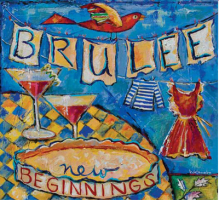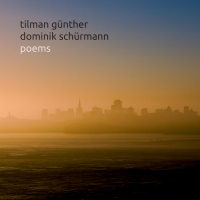Home » Jazz Articles » Album Review » Joseph Daley Earth Tones Ensemble: The Seven Deadly Sins
Joseph Daley Earth Tones Ensemble: The Seven Deadly Sins
Daley was moved to compose this music by Wade Schuman's paintings, also depicting The Seven Deadly Sins. Surely Daley must have been faced with a singular conundrum, one that had to do with the eternally dark nature of sin and the paintings themselves, done in a style somewhat reminiscent of the Northern Renaissance work of the great Albrecht Durer. Daley has resolved this by scoring the music for a complete range of brass and woodwinds—from the high register of the trumpet to the deep voices of the tuba and bass and baritone saxophones. Such is the gravitas of the voices that Daley has managed to capture, in one fell swoop, the dark nature of his subject, as well as give voice to his individual musicians, who annunciate the varying nature of each of the sins. What follows is a superb panoramic journey into the depths of the soul, covering the full range of tonal color and timbral expression, from the blinding colors of "Invidia (Envy)" and "Avarita (Avarice)" to the towering flights of "Superbia (Pride)" and the searing rage of "Ira (Anger)" and the slovenly glissandos of "Desida (Sloth)."
The other piece on the album, "Ballade for the Fallen African Warrior" is elementally different from the other suite in that it has a definite beginning, middle and a dénouement, something that each of the pieces of the title suite have only in themselves and not as a whole. It contains a lilting, elegiac quality that turns heroic at the end its narrative becoming joyful, albeit beginning with elemental sadness. Although the works are meant to be ensemble exercises, baritone saxophonist Howard Johnson ("Avarita"), French hornist Mark Taylor ("Superbia") and bass saxophonist Scott Robinson ("Desida") give excellent accounts of themselves. The real hero of the work is, of course, Joseph Daley.
Track Listing
Invidia (Envy); Avarita (Avarice); Gula (Gluttony); Superbia (Pride); Lechery (Lust); Ira (Anger); Desida (Sloth); Ballade of the Fallen African Warrior.
Personnel
Joseph Daley
tubaJoseph Daley: composer, conductor, euphonium, tuba; Marty Ehrlich: soprano saxophone; Jimmy Cozier: alto saxophone; Bill Saxton: tenor saxophone; Robert DeBellis: tenor saxophone; Howard Johnson: baritone saxophone, contrabass clarinet, tuba; Scott Robinson: bass saxophone, sarrusophone, contrabass saxophone; Lew Soloff: trumpet; Stanton Davis: trumpet; Eddie Allen: trumpet; Reggie Pittman: trumpet; Stephen Haynes: trumpet; Gary Valente: trombone; Alfred Patterson: trombone; Craig Harris: trombone; Earl McIntyre: bass trombone, tuba; Bob Stewart: tuba; Vincent Chancey: French horn; Mark Taylor: French horn; Onaje Allan Gumbs: piano; Benjamin F. Brown: contrabass, electric bass, tuba; Warren Smith: vibraphone, marimba, percussion; Buddy Williams: drum set, percussion; Satoshi Takeishi: Asian drum set, percussion; William "Beaver" Bausch: timbales, percussion; Richard Huntley: percussion; Steve Elson: saxophone; Reut Regev: trombone; Pamela Fleming: trumpet; Bill Barrett: harmonica.
Album information
Title: The Seven Deadly Sins | Year Released: 2011 | Record Label: JARO
Tags
PREVIOUS / NEXT
Support All About Jazz
 All About Jazz has been a pillar of jazz since 1995, championing it as an art form and, more importantly, supporting the musicians who make it. Our enduring commitment has made "AAJ" one of the most culturally important websites of its kind, read by hundreds of thousands of fans, musicians and industry figures every month.
All About Jazz has been a pillar of jazz since 1995, championing it as an art form and, more importantly, supporting the musicians who make it. Our enduring commitment has made "AAJ" one of the most culturally important websites of its kind, read by hundreds of thousands of fans, musicians and industry figures every month.





















